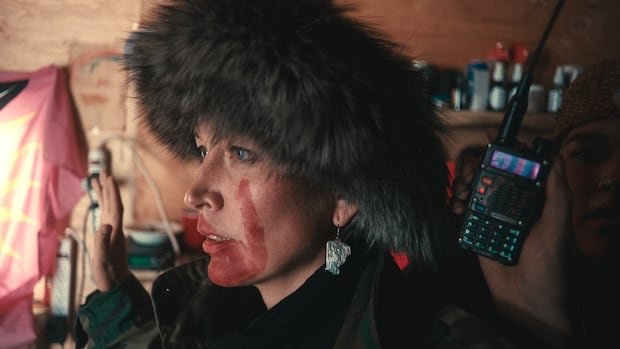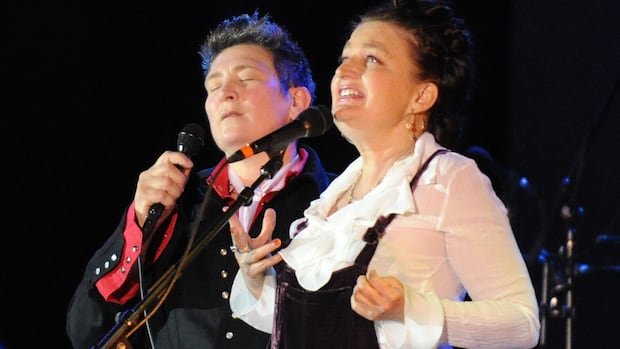A Wet’suwet’en leader convicted after blocking work on the Coastal GasLink pipeline addressed the British Columbia Supreme Court at the end of sentencing arguments Thursday, telling the judge her land “has never been ceded or given up.”
“We are more than our songs and dances. Our ancestors said: we are the earth, and the earth is us. Our laws flow from the earth, we are nothing without it,” Sleydo’ said at the end of the hearing.
Sleydo’, also known as Molly Wickham, chief of the Gidimt’en wing of the Wet’suwet’en nation, was one of three people found guilty of criminal contempt last year by breaking a 2019 court order against people who blocked work on the Coastal GasLink (CGL) pipeline in November 2021.
Shaylynn Sampson, a Gitxsan woman with Wet’suwet’en family ties, and Corey Jocko, who is Kanien’kehá:ka, were also convicted.
Judge Michael Tammen is expected to issue a decision on Friday, after sentencing arguments were presented Wednesday and Thursday in Smithers, BC.
Crown seeks jail sentence; The defense wants time served.
The Crown is seeking jail time for the accused, saying it is necessary to preserve the “rule of law” and deter both those convicted and the general public “from similar actions.”
“This ruling is about how these three critics acted, how those views and how those actions undermine the reputation of the court and the rule of law,” said Crown attorney Paul Battin.
But defense lawyer Frances Mahon argued that a longer prison sentence would further degrade the integrity of the court after a abuse of procedural sentence and argued that time served would be a more appropriate sentence.
In February, Sleydo’, Jocko and Sampson alleged abuse of process in that the alleged RCMP used excessive force during their arrests.
Judge Tammen found that some of the defendant’s Section 7 rights (life, liberty and personal security) were violated during the arrest, and referenced recordings in which several police officers on two separate occasions compared Sleydo’ and Sampson, who were wearing a red handprint painted on their faces, to the orcs in the film. the lord of the rings.
“The court found that these comments were racist, extremely offensive and dehumanizing… They mocked a well-known symbol of missing and murdered Indigenous women, girls and two spirits,” Mahon said.
“What does it say to Canadians, international observers and indigenous people that the victims of this appalling racism will be sent to prison to serve more time, despite this misconduct?”
Battin said the Crown is not arguing the comments were disrespectful, but said a sentence reduction of between two and five days would address that issue.
He argued the prison sentences were justified due to social media posts calling for others to join the blockade after the court order was imposed, the risk to CGL workers who were unable to leave the blockade area for four days, and the risk to the RCMP in enforcing the court order.
‘We’re talking about this specific story’
Battin also said the beliefs of Sleydo’, Jocko and Sampson did not justify their decision to defy a court order, and referenced previous Court of Appeal decisions in which the beliefs of an Indigenous person convicted of criminal contempt were not taken into account in sentencing.
But Mahon said history must be taken into account, referencing the 1997 Delgamuukw decision and a memorandum of understanding (MOU) signed in 2020 between Wet’suwet’en hereditary chiefs and the federal and provincial governments, arguing neither has been implemented in a meaningful way.
“We’re not talking about beliefs here,” Mahon said. “We’re talking about this specific history, which, in essence, has forced the circumstances of the Wet’suwet’en to prove their title beyond the recognition that the provincial and federal governments have not extinguished it.”
“This is an integral component of why they have gone to court,” Mahon said.
The Crown requests a sentence of 30 days for Sleydo’, 25 days for Jocko and 20 days for Sampson, with reductions for time served, and credit of two to five days proposed as a remedy as a result of the abuse of procedural sentence .
The defense is asking for a sentence of time served or a conditional sentencing order, with 100 to 150 hours of community service.
“If the court concludes that additional jail time is required, the sentence could be served in the community to respond to the continued overincarceration of Indigenous people,” Mahon said.
The blockade was delayed, but did not stop, the completion of the 670 kilometer gas pipeline, which transports natural gas through northern British Columbia to a terminal in Kitimat for export to Asia. LNG Canada exported its first shipment in June.









